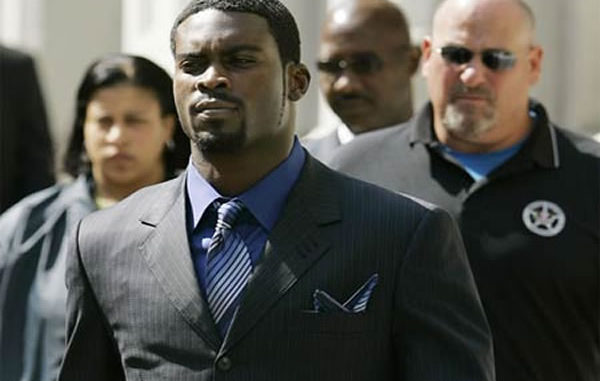In the annals of sports and celebrity culture, few stories resonate with such potent outrage as that of NFL player Michael Vick. The once-renowned quarterback, celebrated for his electrifying prowess on the field, has become a symbolic representation of a darker underbelly within not only sports but society itself. When Vick pled guilty to dog fighting charges, a bombshell reverberated through the consciousness of millions. What does it mean when our idols—those we elevate to pedestal status—engage in activities so heinous and morally repugnant? The fallout from Vick’s actions continues to challenge conventional notions of celebrity, accountability, and societal values.
What if we dare to ask: Can our love for the game overcome our disdain for cruelty? At the heart of Vick’s saga lies a convoluted tension between admiration and moral condemnation. Fans celebrated his athletic talent while simultaneously grappling with the abhorrent nature of his actions. They cheered for spectacular plays, yet were confronted with their conscience when the reality of his offenses came to light. So, how do we reconcile the dichotomy of hero worship and heinous acts?
At first glance, the case might seem like just another controversy in the world of sports—a temporary blip on an otherwise sparkling career. But Vick’s involvement in dog fighting is emblematic of a larger issue that tangles the realms of animal rights, celebrity culture, and moral integrity. The NFL’s handling (or mishandling) of such situations brings up critical questions: Are athletes held to a different set of standards? Why do we grant leniency to individuals who have excelled in their respective sports, regardless of their transgressions? Herein lies a challenge that begs our attention.
In a society fixated on fame, the tolerance level for atrocious behavior diminishes. Vick’s sentence was a mere slap on the wrist compared to the agonizing torment he inflicted upon countless dogs. The brutality of dog fighting surpasses mere animal cruelty; it is a reflection of a societal decay that champions violence and desensitizes us to suffering. This cannot be overlooked. While a lengthy prison sentence was enacted, it underscored the pervasive issue of privilege that pervades the world of professional sports.
Critics argue that with great fame comes greater accountability. Yet, the NFL seemingly operates under a moral ambiguity that all but absolves some players from dire consequences. Vick’s reinstatement in the league—after a brief hiatus—sparks an ideological firestorm. Are we, as a society, too eager to forgive? Should we prioritize athletic prowess over personal integrity? As Vick donned a new jersey and took the field once more, many cheered, but how many felt discomfort at the underlying message: that talent can eclipse accountability?
This isn’t just about Michael Vick; it’s about a cultural phenomenon that tolerates and even idolizes figures who undermine ethical standards. Look at the enmeshment of sports and entertainment, a concoction that often breeds toxic narratives. This case introduces us to a macabre spectacle wherein players thrive at the expense of moral decency. It’s crucial to engage with this pervasive narrative critically. The systemic structures within organizations like the NFL enable this mentality. Strikingly, the league’s policies regarding personal conduct seem more performative than preventative.
But what if the challenge extends beyond the mechanism of sports? We must examine the cultural acceptance of hierarchical power within celebrity, driven largely by capitalism, and the inherent belief that success is a byproduct of talent alone, often disregarding the ethical ramifications. With that in mind, we must question the validity of a culture that perpetuates the notion that greatness can disguise the gravest of sins.
As we wrestle with these heavy dilemmas, it’s imperative to probe deeper into the implications of celebrity status enabled by societal apathy. The media plays a crucial role as it oscillates between condemnation and adulation. Coverage can skew public perception, casting Vick’s dog fighting saga as little more than a footnote in a storied career rather than a monumental ethical failure. Advertisements, endorsements, and public appearances often overshadow the violent reality that lies beneath the polished veneer of fame.
As debates continue to erupt about players’ behavioral accountability and societal norms surrounding them, we must confront the uncomfortable reality that our collective conscience is at stake. Will we continue to indulge in nepotism for our idols, or will we hold them accountable for their choices? Are we unable to disentangle our emotional investments from a warped athletic culture that allows for incongruous behavior? The consequences of silence can be devastating—not just for the victims of cruelty but for the larger ethical landscape.
In closing, Michael Vick’s guilty plea ought to serve as a catalyst for change. It’s a glaring sign that the fabled ‘American Dream’ often comes bundled with moral compromises. It raises the pivotal question of what legacy we choose to uphold. If we seek to foster a society that values compassion over cruelty, today we must start actively confronting our respect for talent with a corresponding respect for life. Dream big in your pursuit of thrills, but never forget that the cost of admiration should never be cruelty masked as entertainment.
